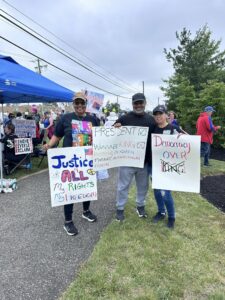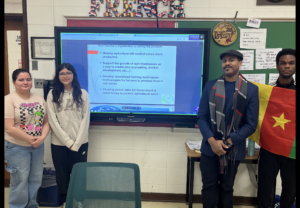El Pueblo Unido To Conduct Immigrant Needs Assessment in Atlantic City, Pleasantville

AC JosepH Media
ATLANTIC CITY — El Pueblo Unido of Atlantic City Y Pueblos Cercanos, a grassroots immigrant justice nonprofit organization, will be launching a comprehensive community needs assessment of the growing immigrant community residing in Atlantic City and Pleasantville this November, organizers said.
The assessment will be done in collaboration with Stockton University’s Dr. Robin Hernandez-Mekonnen, PhD, MSW, Associate Professor of Social Work.
El Pueblo Unido’s community needs assessment of the local immigrant population, one of the first of its kind to study the needs of this population in the region, will be conducted utilizing a community-based participatory research (CBPR) approach.
Accordingly, trained grassroots community leaders from El Pueblo Unido and researchers from Stockton University will work together to survey a target of over 1,000 Latino immigrant community members.
“It’s time we give a voice to an often voiceless community, and this honest assessment of the Latino Immigrant community seeks to do just that. Currently, the City of Atlantic City is 32.8% Latino and 30.8% immigrant, while the City of Pleasantville is 50.3% Latino and 28.0%. immigrant,” said Irvin Moreno-Rodriguez, board chairman of El Pueblo Unido of Atlantic City y Pueblos Cercanos, in a statement.
The organizers said they will use of questionnaires and focus group sessions conducted in both English and Spanish. The community leaders and researchers will collect data on several quality-of-life metrics, including access to and quality of housing, healthcare, employment, education, and transportation, as well as on other key poverty indicators such as food insecurity, financial insecurity, language barriers and legal barriers.
“The key objective of this research is to gain a comprehensive understanding of the issues and everyday worries facing the immigrant community by assessing their livelihood and basic survival needs,” Moreno-Rodriguez said.
“Additionally, the data will be used to gain a deeper understanding of how the Latino immigrant community accesses and utilizes the different resources and services provided by varying existing institutions and social service agencies serving the region.
Moreno-Rodriguez said the stats represent the stories and the plight of hardworking, honest community members that you may never see at a city council meeting or a board of education meeting.
“These community members are elsewhere struggling and working long hours in labor intensive service industry jobs in order to just survive,” Moreno-Rodriguez said. “Our hope is that this survey will answer questions about these community members that have been ignored for far too long. Are they struggling to make the rent or mortgage every month and keep a roof over their families’ heads? Are they struggling to put nutritious food on the table every day?
“Do they have anything left to pay out of pocket for medical expenses, without insurance? Are they being discriminated against or abused at work due to a lack of language skills or legal status?
Do they trust City Hall or the Police or other governmental institutions to offer help when issues arise? These are the answers we seek to uncover,” he added.
Cristian Moreno-Rodriguez, executive director of El Pueblo Unido of Atlantic City y Pueblos Cercanos, said too the issues and concerns of the Latino Immigrant community in Atlantic City and Pleasantville, have been disregarded and ignored.
“Being born and raised by this community, we understand the everyday struggles that our community members suffer from, often in silence,” Cristian Moreno-Rodriguez said. “But we also know that there is a severe lack of resources and community outreach that has been dedicated to solving our communities’ underlying problems.
“Currently, whatever resources and information that are available to the general public have been difficult for our community to access due to language barriers, legal barriers, a lack of awareness and a lack of trust in service providers. This community needs assessment seeks to expose this marginalization in order to address it head-on.”
He said, though, many of the community members feel that no one has been genuinely advocating for them in decision-making spaces and behind closed doors, especially when it comes to allocating resources — and El Pueblo seeks to change that.
“Atlantic City and Pleasantville have seen notable changes in demographics in recent decades, with prominent growth among migrant communities,” Robin Hernandez-Mekonnen, associate professor of social work at Stockton University and principal investigator of community needs assessment.
“It is socially responsible for these municipalities to understand and address unmet needs of its residents, to ensure the well-being of the community.”
El Pueblo Unido of Atlantic City Y Pueblos Cercanos is a New Jersey nonprofit dedicated to empowering marginalized immigrants from Atlantic City and Nearby Towns in order to create a more Just and Inclusive community, one that respects the rights and dignity of all immigrants.
El Pueblo Unido’s work specifically focuses on Immigrant Justice, Tenant Justice, Worker Justice, and Student Justice and seeks to empower the immigrant community through Transformative Education, Community Resource Development, Legal Defense, Civic Engagement, and Community Organizing.
Follow Us Today On:
Subscribe to FRNJ EXTRA premium content newsletter for exclusive information on this event and other premium content, courtesy of Front Runner New Jersey.com.
Note from AC JosepH Media: If you like this story and others posted on Front Runner New Jersey.com, lend us a hand so we can keep producing articles like these for New Jersey and the world to see. Click on SUPPORT FRNJ and make a contribution that will do directly in making more stories like this available. Thank you for reading.










